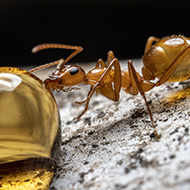Ants can detect cancer in urine, study finds

“Ants can be used as bio-detectors to discriminate healthy individuals from tumour-bearing ones" - Prof. d'Ettorre.
French scientists have shown how the ant species, Formica fusca, can detect cancer in mouse urine, thanks to its incredible sense of smell.
Writing in Proceedings of the Royal Society B: Biological Science, researchers say the insects show 'potential to become a fast, efficient, inexpensive and non-invasive tool for detection of human tumours.'
Study author Professor Patrizia d’Ettorre, of Sorbonne Paris Nord University in Paris, France, told the PA news agency: “Ants can be used as bio-detectors to discriminate healthy individuals from tumour-bearing ones.
“They are easy to train, learn fast, are very efficient and are not expensive to keep.”
In a previous study, Prof. d'Ettorre and her colleagues found that ants were capable of "sniffing out" human cancer cells cultured in the lab.
Building on this research, the team exposed 70 Formica fusca ants to urine samples from tumour-free and tumour-bearing mice. After three trials, the ants were able to differentiate between the urine of healthy mice and the urine of mice that had tumours.
'Chemical analyses confirmed that the presence of the tumour changed the urine odour, supporting the behavioural results,' the authors conclude. 'Our study demonstrates that ants reliably detect tumour cues in mice urine and have the potential to act as efficient and inexpensive cancer bio-detectors.'
Prof d'Ettorre continued: "We trained them with associative learning to associate a given odour - cancer - with a reward and, after very few trials, they learned the association.
"We demonstrated that ants can discriminate the urine of healthy mice from the urine of tumour-bearing mice. This is more similar to a real-life situation than using cultured cancer cells.
"We were surprised by how efficient and reliable the ants are."
Looking ahead, the team hopes to verify their findings using urine samples from humans to see if ants could be used for routine cancer screening.



 The VMD has announced dates for its next Veterinary Dispensary Manager Online Course.
The VMD has announced dates for its next Veterinary Dispensary Manager Online Course.